Alan Baxter's Blog, page 66
May 7, 2012
Tuesday Toot – Patrick O’Duffy
Tuesday Toot is a semi-regular feature here at The Word. An invite-only series of short posts where writers, editors, booksellers and other creatives have been asked to share their stuff and toot their own horn. It’s hard to be seen in the digital morass and hopefully this occasional segment will help some of the quality stuff out there get noticed. It should all be things that readers of The Word will find edifying.
This week, it’s Patrick O’Duffy.
 Who is Patrick?
Who is Patrick?
Patrick O’Duffy is… hang on, should this be first-person or third-person? It’s always weird talking about myself in the third person. It’s too much like I’m Bruce Wayne talking about what a strange fellow that Batman character is.
Okay, I just compared myself to Batman. Which is flattering, but not very accurate. Let’s start again.
I’m an editor and publisher by day, a writer and self-publisher by night, and again I’m falling back upon Bat-metaphors. Anyway, I used to write a lot of material for role-playing games, mostly about vampires and demons and monster-hunters but also occasionally about fantasy adventurers and pirates. Strange that those streams never crossed, really. These days I leave the role-playing for the weekends and write stories about haunted hotels and forensic accountants, and then publish these stories online as independent e-books.
Gosh, what else? I used to live in Brisbane and now I live in Melbourne. I like video games and superhero comics. I like Dungeons & Dragons and microbrewery beer. I dig both genre fiction and literary fiction and don’t understand why so many readers prefer one over the other. I’m a nerd, but my wife thinks I make nerdishness look good.
Oh, and I have a new book out.
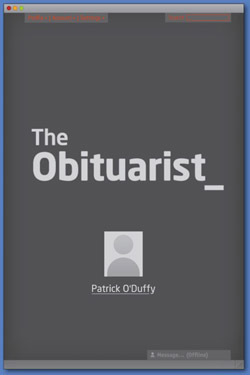 What are you tooting?
What are you tooting?
What happens to your online identity when you die? Who will update your blog when you’re no longer here? And how can you protect yourself from scammers after you’ve passed away?
Help is here.
Kendall Barber calls himself an obituarist – a social media undertaker who settles accounts for the dead. If you need your loved one’s Facebook account closed down or one last tweet to be made, he’ll take care of it, while also making sure that identity thieves can’t access forgotten personal data. It’s his way of making amends for his past, a path that has seen him return to the seedy city of Port Virtue after years in exile.
But now his past is reaching out to catch up with him, just as he gets in over his head with a beautiful new client whose dead brother may have been murdered – if he’s even dead at all. If Kendall doesn’t play his cards right, he could wind up just as deceased as the usual subjects of his work.
On the other hand, Kendall may know more about what cards to play than anyone else realises…
The Obituarist is the story of one very rough week in the life of Kendall Barber. It’s a story about death, identity and how technology affects our interaction with these concepts. It’s a crime story featuring an unlikely detective, angry bikers, a seductive client, illegal chemistry, erratic drug dealers, identity theft, unhygienic cops and a fair bit of swearing.
Interested? Here’s a little to whet your appetite further:
Jay Moledacker was far more handsome in death than he ever had been in life. Okay, not true, but at least his Facebook profile picture was now a lot more dignified. Not difficult, since his profile picture while alive had been a photo of him drunk and vomiting onto a horse during a racing carnival.
Now that he was dead – of an embolism, rather than being kicked to death – he looked regal, elegant and a good six years younger. That’s because I had to use his graduation photo; everything after that point seemed to involve Jay throwing up, getting punched in nightclubs or out cold with FUCKWIT written on his chest in mustard.
A life well lived. Well, a life. Lived.
And it had fallen to me to close it all down.
Which didn’t stop my clients – his parents – from dicking me about on the invoice.
The Obituarist is a novella, available as a $2.99 ebook in a variety of formats. You can find it at Smashwords – http://www.smashwords.com/books/view/... or the Amazon Kindle Store, with other outlets soon to follow.
Read it now. Before you die.
And if you’re interested in Patrick’s other books and projects, check out his blog or follow him on Twitter (@patrickoduffy).
.
May 3, 2012
E-ink devices – the fastest invention in history to become old-fashioned
I’ve been noticing that more and more people are reading e-books from tablets and fewer people are buying e-ink devices like the original Kindle. When I straw-polled this perception on Twitter, it seemed that I was right. While we are seeing more Kindles and Kobos than ever, the number of iPads and other tablet devices seem to far outstrip the e-ink growth.
Further chatting and some links supplied by friendly tweeters backed this up. When I tweeted: “I predict that e-ink devices could be the fastest invention in history to become old-fashioned”, futurist Mark Pesce replied:
@mpesce: They’re already charmingly quaint.
From a shiny new technology to obsolete and replaced in very short order. Already, the Kindle is “charmingly quaint”, like a gramophone player or a phone with a cord and dial. I’m a bit disappointed about this, because I love my Kindle. The thing I like most, apart from the very easy on the eyes e-ink screen, is that it’s a dedicated reading device. No distractions. It holds books and other documents that I need to read and that’s all. There are enough interruptions everywhere else – I don’t need them in a book too. Plus, the battery lasts literally weeks.
But I do have a slight issue in that I love my comics. I’ve read comic books forever and still buy several titles a month. I’d be happy to move to reading those digitally, but for the colour and graphic delivery I’d need a tablet like an iPad. I’ve yet to be able to justify the expense of an iPad purely for reading comics. But if it was for all my e-reading… And that doesn’t even begin to address the multi-media reading experience, with linked footnotes, video content and so much more that tablets make so easy.
But here’s where another problem presents itself. Reading novels (or other straight, unadorned text) from a tablet is problematic at the moment. It’s hard to see outside in the sunshine. The tablet has a terrible battery life, compared to the weeks and weeks I get from my Kindle. The backlit display is more tiring for the eyes. And herein lies the reason tablets are taking over – all those things are being addressed and improved at a furious rate. The tablet is starting to achieve all the positives of a dedicated e-ink reader, along with all the other things it does, making the strengths of e-ink irrelevant.
It’ll be a while before the tablet screen, ink, battery life and so on are as good as, say, a Kindle, but not that long a while. It will happen.
What this boils down to is actually something bigger. The device itself is becoming irrelevant. The beauty of the tablet is that it is a convergent device. You carry one thing and it does everything you need – reading, writing, web surfing, social networking, etc. This leads to a paradigm shift in content creation and delivery. As Eoin Purcell said on Twitter during last night’s conversation:
Things will be sold, but selling will take different forms. Subscriptions, memberships, ads, events, readings etc.
His point being that the content will be in the cloud, the creators and publishers will earn through the things he mentions in the quote above and that content will be consumed on a variety of devices. The device itself becomes irrelevant – all it needs is access to the cloud and a comfortable reading experience. That’s the tablet with the battery life, screen resolution and daylight clarity I talked about above. The implication here is that not only does the device itself become irrelevant – as long as you have one, any one will do – but the concept of an ebook is also irrelevant. You don’t buy a book. You subscribe to a publisher and access their content, whenever, wherever. I’m not entirely sure how I feel about this…
So the dedicated e-reader, like the Kindle or Kobo, is already dead. It just hasn’t stopped kicking yet. Amazon know this, so they’ve released the Fire, which is a tablet device. Others are following suit. For those of us who prefer a dedicated e-ink device, we should make the most of it now. Before long we’ll be the hipsters of the digital reading world, congregating like those people in record stores who still buy vinyl and talk about what stylus they prefer. I wonder if half the people reading this even know what a stylus is.
(For further reading, I’d recommend this article on the subject by Eoin Purcell. Interestingly, this article is already more than two years old.)
.
April 29, 2012
Damnation & Dames in my sweaty paw
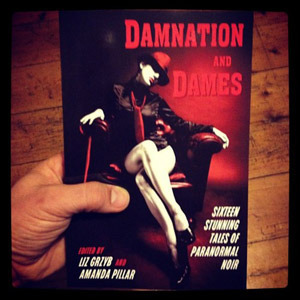 Lookit! I got my contributor copy of Damnation & Dames in the post today. It features the story I co-wrote with Felicity Dowker (who you may remember from such posts as the one right before this one). Our story is called Burning, Always Burning and I’m very proud of it. It’s my first published collaboration, and Felicity’s, so it’s a pleasure to not only feature in another Ticonderoga Publications book, but to share that feature with Felicity.
Lookit! I got my contributor copy of Damnation & Dames in the post today. It features the story I co-wrote with Felicity Dowker (who you may remember from such posts as the one right before this one). Our story is called Burning, Always Burning and I’m very proud of it. It’s my first published collaboration, and Felicity’s, so it’s a pleasure to not only feature in another Ticonderoga Publications book, but to share that feature with Felicity.
And remember me saying in the previous post about how Ticonderoga are producing some of the best books in Australia at the moment, with some of the best covers? Seriously, check that shit out. That’s another sweet-looking cover. Compared to a lot of stuff coming out these days you could be forgiven for thinking that covers are deemed unimportant and can therefore be bland and unimaginative. But not with Ticonderoga.
I can’t wait to read this book, with sixteen paranoirmal tales from a selection of great authors. It’s available now, from here.
Damnation and Dames (tpb)
[978-1-921857-03-4 ]
edited by Liz Grzyb & Amanda Pillar
The anthology brings you sixteen stories of murder and mayhem, monsters and mysterious femme fatales.
324 pages
Lindsy Anderson – The Third Circle
Chris Bauer – Three Questions and One Troll
Alan Baxter & Felicity Dowker – Burning, Always Burning
Jay Caselberg – Blind Pig
M.L.D. Curelas – Silver Comes the Night
Karen Dent – A Case to Die For
Dirk Flinthart – Outlines
Lisa L. Hannett & Angela Slatter – Prohibition Blues
Donna Maree Hanson – Sangue Sella Notte
Rob Hood – Walking the Dead Beat
Joseph L Kellogg – The Awakened Adventure of Rick Candle
Pete Kempshall – Sound and Fury
Chris Large – One Night at the Cherry
Penelope Love – Be Good Sweet Maid
Nicole Murphy – The Black Star Killer
Brian G. Ross – Hard Boiled
.
Bread & Circuses available for pre-order
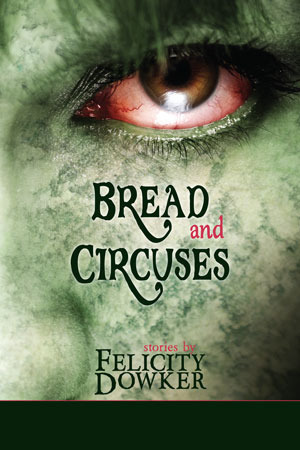 My good friend, occasional collaborator and all-round top wordsmith, Felicity Dowker, has her debut collection of short stories coming out soon from Ticonderoga Publications. It’s called Bread & Circuses and it’s brilliant. I know this for two reasons – 1. Felicity is an awesome writer, so all her stuff is brilliant; and 2. I’ve read all the work included. Yes, even the new, as yet unpublished stories unique to this collection. I know, I’m very lucky. You will be too if you get a copy.
My good friend, occasional collaborator and all-round top wordsmith, Felicity Dowker, has her debut collection of short stories coming out soon from Ticonderoga Publications. It’s called Bread & Circuses and it’s brilliant. I know this for two reasons – 1. Felicity is an awesome writer, so all her stuff is brilliant; and 2. I’ve read all the work included. Yes, even the new, as yet unpublished stories unique to this collection. I know, I’m very lucky. You will be too if you get a copy.
Incidentally, how freaking sweet is that cover? Ticonderoga are producing some of the best books in Australia at the moment and they always have outstanding covers.
Felicity’s work is dark and unrelenting, with delicious stories of revenge and consequence. She mixes the fantastic with the horrific and the mundane with a masterful stroke of beautiful prose. Don’t take my word for it:
“She is one of those rare and talented writers of horror who can creep you out while still making you admire the graceful construction of her prose.” – World Fantasy Award nominee Angela Slatter
“Felicity Dowker is one of the all-too-rare writers who really understands both horror and its appeal. She can show the terrifying aspect of things as outre as enchanted dragons or the zombie apocalypse, or as commonplace as dysfunctional families and the Santa Claus army. To borrow her own words, ‘It hurts, and it’s horrible, and it’s beautiful . . . and we might as well enjoy it’.” – Award-winning Stephen Dedman
The book is available for pre-order now, so go get some. The official launch will be at Continuum in Melbourne in June, so get there too if you can.
.
April 25, 2012
I woke up to a Ditmar Award nomination
I woke up this morning to discover that the 2012 Ditmar Award shortlist has been announced. Imagine my surprise when I saw my own name listed under the Best New Talent category. I knew I was eligible and had mentioned that fact here before, but it was still a very pleasant surprise to see myself nominated. It seems strange, given how long I’ve been working at this caper, that I would be listed as a New Talent. Of course, compared to some of the veteran penmomkeys in Australia, I still am very much a noob. But with two novels and close to 40 short stories published over something like seven years, “New” does seem like a strange term.
However, as the rules of the Ditmar Awards explain, Best New Talent is a fairly broad statement. If anything, the name of the award is misleading. From the Ditmar Award wiki:
The Best New Talent award recognises excellence of achievement in any field of the genre by an individual who has not been nominated for a recognised award three or more years before the year the award is held. Recognised awards include but are not limited to: Australian SF (“Ditmar”) Awards, WA SF Achievement Awards (Tin Ducks), Aurealis, Hugo and Nebula Awards. An individual is only eligible for two consecutive years.
So Best New Talent is really an award for Best Thus Far Unrewarded Talent. Or something. Either way, I’m very happy to see my name on the list and it would be great to score a win. I’m up against Joanne Anderton and Steve Cameron in that respect, so best of luck to those guys too!
And remember, this is a popular vote, not a judged award, so it’s down to people active in the scene to help get the results they want. If you’re eligible to vote, you really should. It takes hardly any time at all and the only way give these kind of awards any sort of credibility is to make sure the voting pool is as big and varied as possible, to ensure a result that’s more in keeping with the broader view of the community and fandom, rather than the narrow view of only a handful of active voters.
Congratulations and best of luck to all the nominees!
The full shortlists and all the official voting stuff is below:
The official ballot paper, including postal address information, may be downloaded as a PDF format file from: http://ditmars.sf.org.au/2012/2012_Ditmar_ballot.pdf
Votes will be accepted via email to: ditmars@sf.org.au
However, if possible, please vote online at: http://ditmars.sf.org.au/2012
Postal ballots will be distributed in the near future.
Voting for the Ditmar Award is conducted in accordance with the rules specified at http://wiki.sf.org.au/Ditmar_rules, and is open to members of Continuum 8 (including supporting members) and to members of Swancon 36 who were eligible to vote in the 2011 Award. Voting in all award categories is by the optional preferential system, and each eligible individual may vote only once. All ballots (including emailed ballots) should include the name and address of the voter. If you have questions regarding the ballot or voting procedure, please email ditmars@sf.org.au.
And here’s the full shortlist for all categories:
Best Novel
* The Shattered City (Creature Court 2), Tansy Rayner Roberts (HarperCollins)
* Burn Bright, Marianne de Pierres (Random House Australia)
* Mistification, Kaaron Warren (Angry Robot Books)
* The Courier’s New Bicycle, Kim Westwood (HarperCollins)
* Debris (The Veiled Worlds 1), Jo Anderton (Angry Robot Books)
Best Novella or Novelette
* “The Sleeping and the Dead”, Cat Sparks, in Ishtar (Gilgamesh Press)
* “Above”, Stephanie Campisi, in Above/Below (Twelfth Planet Press)
* “The Past is a Bridge Best Left Burnt”, Paul Haines, in The Last Days of Kali Yuga (Brimstone Press)
* “And the Dead Shall Outnumber the Living”, Deborah Biancotti, in Ishtar (Gilgamesh Press)
* “Julia Agrippina’s Secret Family Bestiary”, Tansy Rayner Roberts, in Love and Romanpunk (Twelfth Planet Press)
* “Below”, Ben Peek, in Above/Below (Twelfth Planet Press)
Best Short Story
* “Breaking the Ice”, Thoraiya Dyer, in Cosmos 37
* “Alchemy”, Lucy Sussex, in Thief of Lives (Twelfth Planet Press)
* “The Last Gig of Jimmy Rucker”, Martin Livings and Talie Helene, in More Scary Kisses (Ticonderoga Publications)
* “All You Can Do Is Breathe”, Kaaron Warren, in Blood and Other Cravings (Tor)
* “Bad Power”, Deborah Biancotti, in Bad Power (Twelfth Planet Press)
* “The Patrician”, Tansy Rayner Roberts, in Love and Romanpunk (Twelfth Planet Press)
Best Collected Work
* The Last Days of Kali Yuga by Paul Haines, edited by Angela Challis (Brimstone Press)
* Nightsiders by Sue Isle, edited by Alisa Krasnostein (Twelfth Planet Press)
* Bad Power by Deborah Biancotti, edited by Alisa Krasnostein (Twelfth Planet Press)
* Love and Romanpunk by Tansy Rayner Roberts, edited by Alisa Krasnostein (Twelfth Planet Press)
* Ishtar, edited by Amanda Pillar and K. V. Taylor (Gilgamesh Press)
Best Artwork
* “Finishing School”, Kathleen Jennings, in Steampunk!: An Anthology of Fantastically Rich and Strange Stories (Candlewick Press)
* Cover art, Kathleen Jennings, for The Freedom Maze (Small Beer Press)
Best Fan Writer
* Tansy Rayner Roberts, for body of work including reviews in Australian Speculative Fiction in Focus! and Not If You Were The Last Short Story On Earth
* Alexandra Pierce, for body of work including reviews in Australian Speculative Fiction in Focus!, Not If You Were The Last Short Story On Earth, and Randomly Yours, Alex
* Robin Pen, for “The Ballad of the Unrequited Ditmar”
* Sean Wright, for body of work including “Authors and Social Media” series in Adventures of a Bookonaut
* Bruce Gillespie, for body of work including “The Golden Age of Fanzines is Now”, and SF Commentary 81 & 82
Best Fan Artist
* Rebecca Ing, for work in Scape
* Lisa Rye, for “Steampunk Portal” series
* Dick Jenssen, for body of work including work in IRS, Steam Engine Time, SF Commentary and Scratchpad
* Kathleen Jennings, for work in Errantry (tanaudel.wordpress.com) including “The Dalek Game”
* Rhianna Williams, for work in Nullas Anxietas Convention Programme Book
Best Fan Publication in Any Medium
* SF Commentary, edited by Bruce Gillespie
* The Writer and the Critic, Kirstyn McDermott and Ian Mond
* The Coode Street Podcast, Jonathan Strahan and Gary K. Wolfe
* Galactic Chat, Alisa Krasnostein, Tansy Rayner Roberts and Sean Wright
* Galactic Suburbia, Alisa Krasnostein, Tansy Rayner Roberts, and Alex Pierce
Best New Talent
* Steve Cameron
* Alan Baxter
* Joanne Anderton
William Atheling Jr Award for Criticism or Review
* Liz Grzyb and Talie Helene, for “2010: The Year in Review”, in The Year’s Best Australian Fantasy and Horror 2010 (Ticonderoga Publications)
* Damien Broderick and Van Ikin, for editing Warriors of the Tao: The Best of Science Fiction: A Review of Speculative Literature (Borgo Press)
* David McDonald, Tansy Rayner Roberts and Tehani Wessely for “Reviewing New Who” series, in A Conversational Life
* Alexandra Pierce and Tehani Wessely, for reviews of Vorkosigan Saga, in Randomly Yours, Alex
* Russell Blackford, for “Currently reading: Jonathan Strange and Mr Norrell by Susanna Clarke”, in Metamagician and the Hellfire Club
.
April 24, 2012
Emerging Writers’ Festival 2012
The Emerging Writers’ Festival is coming around again from May 24 – June 3. You may remember that I went up to Brisbane last year and took part. I’ll be involved again, this time in Melbourne. It’s a brilliant event and well worth your time whether you’re new and emerging or an old hand at penmonkeying. I’m on a panel again, this time about what happens after you’re published:
Post-Publication, Saturday 3pm, 26th May
Congratulations – you’ve been published! Now what? Our writers share their experiences and advice on what awaits once your work is out in the world. With Ali Alizadeh, Alan Baxter, Emmett Stinson and Stella Young. Hosted by Sam Cooney.
But that panel alone is a tiny fraction of all the awesome stuff going on as part of EWF 2012. There’s loads of information here and a full program of events here.
So much good stuff. And you can keep up to speed on Twitter with the #ewf12 hashtag and by following @EmergingWriters. Be there!
.
April 20, 2012
Emma Newman’s Split Worlds
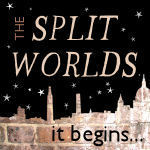 I’ve got something a bit special for you all today. Emma Newman is a great new voice in speculative fiction, and she’s got an intriguing project on the go. If you think you recognise that name, you’re right. A year and a day ago (isn’t that a nicely fairy tale thing to say) I reviewed her debut short story collection, From Dark Places after the publisher asked me to blurb it for her. I was happy to do so – it’s a great collection and you should get a copy. Anyway, now Emma has this very amibitious new thing going on.
I’ve got something a bit special for you all today. Emma Newman is a great new voice in speculative fiction, and she’s got an intriguing project on the go. If you think you recognise that name, you’re right. A year and a day ago (isn’t that a nicely fairy tale thing to say) I reviewed her debut short story collection, From Dark Places after the publisher asked me to blurb it for her. I was happy to do so – it’s a great collection and you should get a copy. Anyway, now Emma has this very amibitious new thing going on.
Every week for a year (Tuesday November 1st 2011 to Thursday November 1st 2012), Emma is posting a new short story from her Split Worlds series of connected yarns. Each new story is hosted in a different place, and this week it’s my turn. So I’ll stop crapping on and let Emma explain:
***
This is the twenty-fifth tale in a year and a day of weekly short stories set in The Split Worlds. If you would like me to read it to you instead, you can listen here. You can find links to all the other stories, and the new ones as they are released here.
The Necessary Witness
Martin opened the bottle of beer and passed it to his brother-in-law, studying the bags under his eyes as he did so. He looked awful, and whilst he’d been warned by his sister, he hadn’t really appreciated it until he saw him in the flesh.
“Thanks for coming,” Paul said and took a long gulp of beer from the bottle’s neck. He looked at the kitchen clock, then at his watch. “It’ll be any time in the next hour.”
“What will?”
“The thing I need you to see. The thing I can’t make Helen understand.”
“She said you’re having problems.”
“I think she wants to leave me,” Paul put the bottle down and rested his elbows on the kitchen worktop, letting his head droop. “I don’t blame her. I would leave me, if I could.”
“Why?”
Paul looked over his shoulder at him with bloodshot eyes. “Because I’m a fucking lunatic.”
Martin twisted his own bottle, out of his depth. He was an accountant, not a counsellor. “You um… you want to talk about it?” Please say no, he thought.
“I need to show you,” Paul said, straightening up. “Helen’s away at a conference, and it’s due to happen tonight, I need someone else to be here when it does. I need someone else to see it, because every time I try to talk to Helen about it, I can’t. I… I can’t even tell you.”
Martin put his hand on his shoulder, guided him through into the living room, trying to rein in the mental images of potentially embarrassing things Paul might want to show him, mostly a variety of bizarre growths in the nether regions. He resisted the urge to talk about the football or the latest idiocy the government had come out with, all the comfortable safe topics he usually depended upon with his family. “Something’s bothering you, I can see it,” he said, sitting on the sofa next to him. “Maybe it won’t seem so bad if you just tell me what kicked all this off.”
Paul downed the rest of the beer and dumped the bottle on the coffee table. “It started three months ago. I went for a drink with some friends from work, we’d finished a big project, we were ready for a break.”
An affair, Martin thought. Christ, what am I going to tell my sister?
“We’d been there a while, I’d had a few but not too many, and there was this woman there, she was… God, she was gorgeous.”
Martin began to panic. His sister would be devastated. They’d been together for ten years, married for six of them.
“She came over and said “I know this is a weird thing to ask, but I need a man’s shadow.” And we laughed and she explained she was an art student and that I had the perfect shape for this project she was working on.”
“That’s quite a chat-up line,” Martin said.
“But that’s the thing, it wasn’t,” Paul replied. “That’s not how I saw it anyway. Like I said, I’d had a few, she was hot, I said I’d help. She said the picture had to be taken outside, in natural light, so I left the pub with her.”
“Are you having an affair?” Martin couldn’t help himself, couldn’t listen to the build-up any longer.
Paul’s shock was reassuring. “Good God no! You think I’d do that to Helen? Bloody hell Martin, I’m not the kind of-”
“Sorry,” Martin said, patting the air. “It’s just… that’s what it sounded like. Go on, I’m sorry.”
“She took me to a quieter street, set up this camera on a tripod thing she had with her and arranged me, like a model I suppose. We laughed and chatted about it, it all seemed totally normal. Well, as normal as it could be. Then when she was happy with the way the shadow looked, she pulled out this… I dunno, test-tube full of powder and chucked it all over it.”
“For the picture?”
“That’s what I thought, it was all kinds of colours and it had some glitter in it. She was whispering when she did it, I thought that was arty, then she took the picture, said thanks and left. I didn’t think much of it, but now I look back, I did feel… I don’t know, a bit odd when she chucked that stuff all over the shadow.”
“So has she used your picture for something dodgy?” Martin could see it now; pictures of his brother-in-law all over Facebook, photo-shopped into doing something unspeakable.
“God, I wish she had,” Paul shivered. “Oh no… it’s going to happen soon, I can feel it.”
“What?” Martin gripped the beer bottle as he watched Paul’s eyes snap to his shadow. It was stretched out over the rug and looked completely normal.
“You can see it, can’t you? My shadow.”
“Yes.”
Paul jumped to his feet and moved the two lamps in the room to one side, switched them on and turned off the overhead light. “Keep watching it,” he said, pointing at the shadow, now darker and stretched long by the newly focused light.
“Paul, you still haven’t told me what-”
“Look!”
Martin followed Paul’s pointed finger to see the shadow twitch. He glanced back at Paul who was standing still, sweating and pale faced but definitely not twitching. Then the shadow moved, one leg stretching away from the sole of Paul’s shoe, as if pulling itself away from something sticky. Before Martin had a chance to speak the expletives filling his mind, the shadow completely detached, now looking like it was cast by Paul running out of the room, even when he still stood there, shivering violently.
“Did you see that?” he demanded and Martin nodded dumbly. “I thought I was going mad, it’s the… sixth, seventh time it’s happened. I don’t know where it goes or-”
“Let’s follow it!” Martin said, abandoning the beer and heading for the door. A tiny part of himself felt like he was a child getting older again, frantically believing the fantastical at any opportunity as the world became more dull. Then he stopped thinking and burst out of the house into the twilight, his shadowless brother-in-law behind him.
To be continued!
—
Thanks for hosting Alan!
I hope you enjoyed the story. If you would like to find out more about the Split Worlds project, it’s all here: www.splitworlds.com – you can also sign up to get an extra story and get each new story delivered to your inbox every week. If you would like to host a story over the coming year, either let me know in the comments or contact me through the Split Worlds site.
Em x
.
April 18, 2012
Lots of love for Dead Red Heart
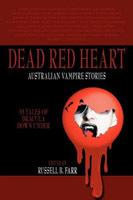 You guys will remember the massive Australian vampire anthology from Ticonderoga Publications called Dead Red Heart. It featured my story, Punishment Of The Sun.
You guys will remember the massive Australian vampire anthology from Ticonderoga Publications called Dead Red Heart. It featured my story, Punishment Of The Sun.
My story got a place in Ellen Datlow’s Honorable Mentions for 2011, and will be listed in Best Horror Of The Year, Volume 4. As if that wasn’t happy-happy news enough for me, Ellen released the full list of 608 recommended stories for 2011 and no fewer than 16 of the 33 stories in Dead Red Heart are on it. Congratulations to editor Russell B Farr for putting together such an amazing book.
So huge congratulations to:
Anderton, Joanne “The Sea at Night,” Dead Red Heart.
Baxter, Alan “Punishment of the Sun,” Dead Red Heart.
Brown, Simon “Thin Air,” Dead Red Heart.
Cavalchini, Damon “Renfield’s Wife,” Dead Red Heart.
Edwards, Jacob “Behind the Black Mask,” Dead Red Heart.
Fay, Joanna “Black Heart,” Dead Red Heart.
Gates, Raymond “The Little Red Man,” Dead Red Heart.
Hannett, Lisa L. White and Red in the Black,” Dead Red Heart.
Hanson, Donna Marie “The Life Stealer,” Dead Red Heart.
Ivanoff, George “Vitality,” Dead Red Heart.
Jensen, Patty “Quarantine,” Dead Red Heart.
Kempshall, Pete “All that Glisters,” Dead Red Heart.
Lawson, Chris “Apologetoi,” Dead Red Heart.
Mok, Anne “Interview with the Jiangshi,” Dead Red Heart.
Slatter, Angela “Sun Falls,” Dead Red Heart.
White, Jen “Listening to Tracy,” Dead Red Heart.
And, on top of that, the latest BLACK STATIC magazine (http://ttapress.com/blackstatic/currentissue/) has reviewed Dead Red Heart as part of a big vampire feature. Their reviewer has gone through all 33 stories and had something to say about each and every one. I got to see a preview of the review and this is what the reviewer said about my story:
Genuinely creepy, ‘Punishment of the Sun’ by Alan Baxter has a vampire isolated by his kind at a remote farming station, and the family slowly realising that they are prey, the sense of menace and gradual, mounting terror put over well.
When anything of mine is called “genuinely creepy” one of my demon minions gets a new set of wings.
The reviewer said of the book as a whole:
an overall excellent collection, one in which nearly all of the stories are unusual and offer different slants on the idea of the vampire, while retaining an essentially Australian feel.
So seriously, if you haven’t got it yet, get it now.
And while you’re at it, get yourself on a subscription to Black Static magazine, because that’s one great publication too.
.
April 17, 2012
Some genre news and links
There’s been some interesting bits and pieces cropping up around the web just lately. First off, you may remember I was very pleased to discover that my story, Punishment Of The Sun, from the Dead Red Heart anthology is going to be included in Ellen Datlow’s Honorable Mentions that will be appearing in The Best Horror of the Year volume four. The HM stories actually listed in the book are the top fifty from a massive Honorable Mentions list that Ellen compiles. She’s just released the full list of 608 Honorable Mentions, which is the best of what she’s read in 2011. I have no idea how she manages to read so much, but bless her for doing do – Ellen Datlow is an absolute treasure and a giant in her field. The full list of 608 is here. And there’s a lot of Aussies on there.
Secondly, there’s a new genre convention coming. The first one is in Sydney, arranged by the Australian Writer’s Marketplace. It’s called, fittingly enough, GenreCon. From the website:
GenreCon is a three-day convention for Australian fans and professionals working within the fields of romance, mystery, science fiction, crime, fantasy, horror, thrillers, and more. One part party, one part celebration, one part professional development: GenreCon is the place to be if you’re an aspiring or established writer with a penchant for the types of fiction that get relegated to their own corner of the bookstore.
I’ll definitely try to get along to that one, especially as it’s relatively local for me.
Lastly, there’s this: http://www.surveymonkey.com/s/K8YZ2X7
It’s a survey collecting votes for the Independent eBook Award. I’m not really sure what the Award is and I’m having trouble finding out much about anything to do with it, to be honest. But it’s drawing attention, hopefully, to independent and small press publications, which is a good thing. From the site:
Nominations are open to an independent author or independent/small press. For purposes of this award, we are defining a “small press” as follows:
1. Publisher does not charge authors for publication, and is fully responsible for all production of the book
2. Publisher produces fewer than 50 titles a year
3. Publisher is publishing original work, not predominately public domain titles or Private-Label rights titles
4. Publisher is independently owned, not part of a larger corporation.
Authors and publishers are not allowed to vote for themselves and will be disqualified for doing so. They’re trying to make this as transparent and fair as possible, but it will be interesting to see how it all pans out. And yes, for point of reference, my books do qualify under their definition of small press. I really wish there were some further links or references on that survey page, though, so we could find out more about who these people are and what they’re doing. If you know any more, please leave a comment below!
.
April 12, 2012
Friday the 13th
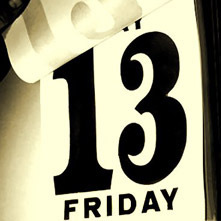 Today is Friday the 13th. Ooooh, cue Twilight Zone music. Of course, it’s all superstitious bollocks, like being afraid to walk under a ladder or thinking a political agitator died two thousand years ago for your sins. I mean, really? Get over yourself. But why is Friday 13th considered unlucky? Folklore and superstition is some pretty interesting stuff and it’s great fodder for stories. The more we draw on existing mythologies and folk tales, that have endured over centuries for a reason, the more we can make our own stories feel authentic and convincing, thereby helping readers to suspend disbelief and enjoy a fictional journey. And who knows, maybe in two thousand years there’ll be a group of weirdos attending the Church of RealmShift, praying to the god Isiah for absolution. That would be quite funny, but we really should have grown out of this stuff already, so considering another two thousand years of it is a bit sad.
Today is Friday the 13th. Ooooh, cue Twilight Zone music. Of course, it’s all superstitious bollocks, like being afraid to walk under a ladder or thinking a political agitator died two thousand years ago for your sins. I mean, really? Get over yourself. But why is Friday 13th considered unlucky? Folklore and superstition is some pretty interesting stuff and it’s great fodder for stories. The more we draw on existing mythologies and folk tales, that have endured over centuries for a reason, the more we can make our own stories feel authentic and convincing, thereby helping readers to suspend disbelief and enjoy a fictional journey. And who knows, maybe in two thousand years there’ll be a group of weirdos attending the Church of RealmShift, praying to the god Isiah for absolution. That would be quite funny, but we really should have grown out of this stuff already, so considering another two thousand years of it is a bit sad.
Anyway, Friday 13th – where does that particular bad luck superstition come from? Well, the answer, as is so often the case: No one knows. But there are a lot of theories. Interestingly, this particular superstition seems to be quite young, with no real references before the 20th century. Going to the fount of all knowledge (Wikipedia, obviously), we get these possibilities:
1. In numerology, the number twelve is considered the number of completeness, as reflected in the twelve months of the year, twelve hours of the clock, twelve gods of Olympus, twelve tribes of Israel, twelve Apostles of Jesus, the 12 successors of Muhammad in Shia Islam, etc., whereas the number thirteen was considered irregular, transgressing this completeness. There is also a superstition, thought by some to derive from the Last Supper or a Norse myth [more on this later - Alan], that having thirteen people seated at a table will result in the death of one of the diners.
2. Friday has been considered an unlucky day at least since the 14th century’s The Canterbury Tales, and many other professions have regarded Friday as an unlucky day to undertake journeys, begin new projects or deploy releases in production. Black Friday has been associated with stock market crashes and other disasters since the 1800s.
3. One author, noting that references are all but nonexistent before 1907 but frequently seen thereafter, has argued that its popularity derives from the publication that year of Thomas W. Lawson’s popular novel Friday, the Thirteenth, in which an unscrupulous broker takes advantage of the superstition to create a Wall Street panic on a Friday the 13th. Records of the superstition are rarely found before the 20th century, when it became extremely common.
It seems that there were existing superstitious issues regarding both the number 13 and Fridays, so it seems “logical” that Friday the 13th is doom with extra tragic sauce.
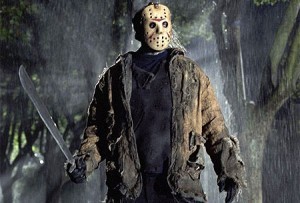 Another theory is that Primitive man had only his 10 fingers and two feet to represent units, so he could count no higher than 12. What lay beyond that — 13 — was an impenetrable mystery to our prehistoric forebears, hence an object of superstition.
Another theory is that Primitive man had only his 10 fingers and two feet to represent units, so he could count no higher than 12. What lay beyond that — 13 — was an impenetrable mystery to our prehistoric forebears, hence an object of superstition.
That doesn’t really take into account toes, though, so seems like a dodgy idea to me. Not to mention that surely there would be no evidence of anything beyond 12, thereby nothing to be scared of. It certainly wouldn’t have been called 13… or would it? That one makes no bloody sense at all.
Here’s another interesting idea from David Emery at Urban Legends:
Still other sources speculate that the number 13 may have been purposely vilified by the founders of patriarchal religions in the early days of western civilization because it represented femininity. Thirteen had been revered in prehistoric goddess-worshiping cultures, we are told, because it corresponded to the number of lunar (menstrual) cycles in a year (13 x 28 = 364 days). The “Earth Mother of Laussel,” for example — a 27,000-year-old carving found near the Lascaux caves in France often cited as an icon of matriarchal spirituality — depicts a female figure holding a crescent-shaped horn bearing 13 notches. As the solar calendar triumphed over the lunar with the rise of male-dominated civilization, it is surmised, so did the “perfect” number 12 over the “imperfect” number 13, thereafter considered anathema.
I quite like that theory, not it’s got just enough bastardry in it to make it an enduring myth, and enough impetus for men in power to keep pushing their agenda. It would explain a lot about why 13 is so consistently recognised as a “bad” number if it meant men could retain some patriarchal power. Of course, it also means that superstitious feminists should embrace Friday the 13th, and that might give rise to some brain implosions.
And from the same source, here’s that great Norse yarn, mentioned earlier:
Twelve gods were invited to a banquet at Valhalla. Loki, the Evil One, god of mischief, had been left off the guest list but crashed the party, bringing the total number of attendees to 13. True to character, Loki raised hell by inciting Hod, the blind god of winter, to attack Balder the Good, who was a favorite of the gods. Hod took a spear of mistletoe offered by Loki and obediently hurled it at Balder, killing him instantly. All Valhalla grieved. And although one might take the moral of this story to be “Beware of uninvited guests bearing mistletoe,” the Norse themselves apparently concluded that 13 people at a dinner party is just plain bad luck.
David also points out that there were 13 present at the Last Supper, one of whom betrayed Jesus and triggered the Crucifixion. And that crucifixioin allegedly took place on a Friday. The bad news is just stacking up for the mythologically-minded.
David Emery’s entire article makes for great reading on the subject, so maybe you should just go there and read the whole thing. I’ll wait here.
Good, wasn’t it?
Here’s an interesting extra tidbit, though:
The Dutch Centre for Insurance Statistics (CVS) on June 12, 2008, stated that “fewer accidents and reports of fire and theft occur when the 13th of the month falls on a Friday than on other Fridays, because people are preventatively more careful or just stay home. Statistically speaking, driving is slightly safer on Friday the 13th, at least in the Netherlands; in the last two years, Dutch insurers received reports of an average 7,800 traffic accidents each Friday; but the average figure when the 13th fell on a Friday was just 7,500.”
It’s a small difference, but I do love me a bit of irony.
Anyway, if you really want to test your superstitious credulity this is the year for it – there will be three occurrences of Friday 13th in 2012, exactly 13 weeks apart. OH MY GODS WE’RE DOOMED!

Not that everyone needs to worry. The Spanish and Greeks consider Tuesday 13th bad luck, and the Italians are concerned about Friday 17th. You see, it’s all bollocks.
On the upside, we do get some brilliant words from the superstition:
The fear of Friday the 13th has been called friggatriskaidekaphobia (Frigga being the name of the Norse goddess for whom “Friday” is named and triskaidekaphobia meaning fear of the number thirteen). Seriously, say that word out loud and see if you don’t love it. FRIGGATRISKAIDEKAPHOBIA! Now, your mission, should you choose to accept it, is to use that word today in casual conversation. Best of luck.
There’s also paraskevidekatriaphobia a concatenation of the Greek words Paraskeví (Παρασκευή, meaning “Friday”), and dekatreís (δεκατρείς, meaning “thirteen”) attached to phobía (φοβία, from phóbos, φόβος, meaning “fear”).
My preference definitely goes with friggatriskaidekaphobia, though.
Regardless, the only real bad luck I’ve ever heard of relating to anything directly related to this stuff is a stunt in the US many years ago. A guy was going for a bungee jump stunt where he would bungee off the side of a building and pick up a can of soda from the pavement. Extremely careful calculations were made, regarding his weight, the bungee rope, the distance and so on, to make such a dangerously accurate jump. Finally ready, he made the jump and smashed his head into the pavement and died. Why? Because many US buildings don’t have a 13th floor, skipping from 12 to 14, so the calculations of the building’s height were out by one storey. So 13 was definitely unlucky for that guy, but in a rather ironic way. Of course, all that could just be an urban legend, but it’s a great story nonetheless. And good stories are the best thing about all superstitions.
.



